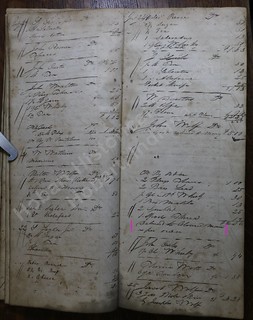
(Click on image to enlarge)
Image courtesy of the Hobart Historical Society.
I believe that John Wolf, at whose direction the "coloured man" collected these purchases, was the son of Jacob Wolf, based on this statement in Porter and Lake Counties (Goodspeed-Blanchard): "In the spring of 1834, Jacob Wolf and family located in the solitudes of Portage with his family. His sons John, Jacob and E. Wolf were grown at the time."[1] I cannot find a separate household for John in the 1840 Census; he may have been living with his father, but since the census did not record anyone's name beyond the head of the household, it's hard to tell. Jacob Sr.'s household consisted of 13 people — five female and eight male, one of whom was a "free colored" man.[2]
The census form used what is now the standard American spelling — colored — while the ledger-keeper used what we now think of as the British/Canadian spelling: coloured. That got me wondering whether the spelling could tell us anything about the ledger-keeper's native country. A little internet research convinced me that it probably couldn't tell us anything for certain: both styles were widely used on both sides of the Atlantic for the first two or three centuries of English-speaking settlement in the New World. (When I say "both styles," I don't mean to imply that people recognized two separate standards of spelling and used them interchangeably — the situation was more chaotic than that.) Noah Webster is generally credited with influencing the standard of "American" spelling, which he consciously chose because he preferred its simplicity. His first dictionary was published in 1806 and an expanded one in 1828. But I find it hard to believe that no one born in the U.S. after 1806 was ever taught to spell in what we now think of as the British way.
___________________
[1] Jacob's son, Josephus, known to us now for his brick mansion, was still a minor in 1840.
[2] I have not been able to trace this man beyond the 1840 census, so I don't know his name, much less his story.


No comments:
Post a Comment